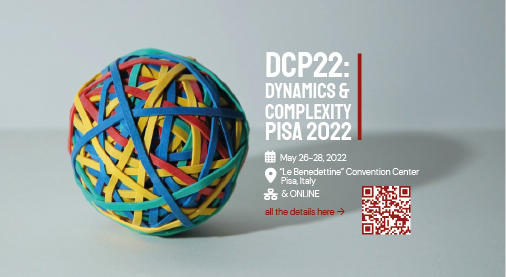DCP22 – DYNAMICS & COMPLEXITY PISA 2022
DCP22 – DYNAMICS AND COMPLEXITY
26-28 Maggio 2022 presso Le Benedettine
Piazza S. Paolo a Ripa D’Arno 16 Pisa
Complex systems are ubiquitously and characterized by the nonlinear interaction of its constituents, thus triggering the emergence of self-organized structures. In many research fields it has become possible to get simultaneous observations with high time/space resolution, e.g., neural networks (in vivo or in vitro), single particle tracking in biological systems such as cell cytoplasm and membrane, social and economic networks. In this sense, COMPLEXITY science is nowadays often referred to the development of reliable and accurate statistical tools being able to extract information from a large amount of data. A great effort is being devoted to the so-called knowledge discovery (data mining, artificial intelligence), devoted to find recurrences and correlations and, in general, self-organization in the datasets. The main goal is to derive statistical indices that are both synthetic and informative.
A great challenge is the development of models and statistical tools being able to extract the causal relationships among variables. Thus, the focus of the scientific community is moving towards the investigation of the internal DYNAMICS generating the dataset in order to develop modelling tools that are not only descriptive but also temporally predictive.
The main aim of the workshop is that of showing the importance of multidisciplinary and unifying approaches for the investigation of complex systems. Another important objective of DCP22 is to point out the importance of the use of new and innovative approaches for the study of nonlinear dynamical systems. The workshop will be organized in different topical sections, each comprising a series of specific talks on some of the ongoing and more promising researches lines on complex systems.
We encourage the submission of works concerning the investigation, either theoretical, methodological, or experimental, of complex multi-component systems, with particular focus on the dynamical modelling. Methods and models may include (but are not limited to): stochastic modelling, nonlinear dynamical systems, mono-/multi-scaling analysis, fractals and multi-fractals, long-range memory (non-Markovian processes, Lévy flights and walks), anomalous diffusion, fractional models, critical phenomena, Self-Organized Criticality, complex network analysis, data mining, artificial intelligence, bioinformatics.

